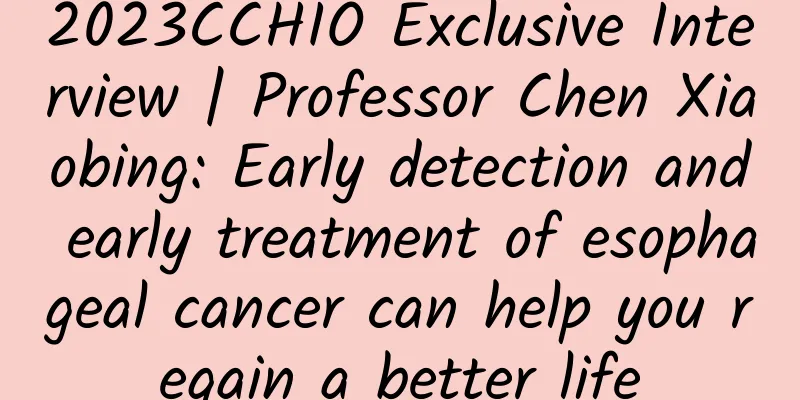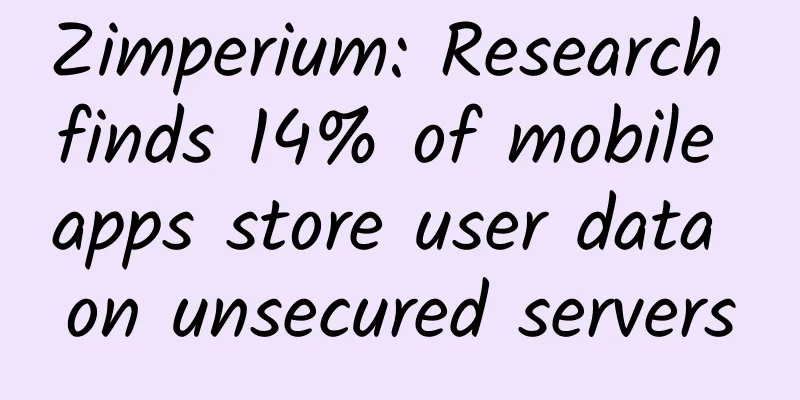2023CCHIO Exclusive Interview | Professor Chen Xiaobing: Early detection and early treatment of esophageal cancer can help you regain a better life

|
The occurrence of esophageal cancer is actually closely related to our daily life. Among the many digestive tract diseases, the incidence of esophageal cancer has increased year by year, bringing great pain and distress to many patients. However, through early prevention, early detection and early treatment, the harm of esophageal cancer can be effectively reduced, helping patients and their families regain the joy of life. Professor Chen Xiaobing Chief Physician, Doctor of Medicine, Doctoral Supervisor, Postdoctoral Co-supervisor Deputy Director of Internal Medicine Department, Henan Cancer Hospital, Director of the Second Ward of Gastroenterology Department Member of the 9th Council of the Chinese Anti-Cancer Association (CACA) The first batch of members of the National Health Science Popularization Expert Database of the Healthy China Action Promotion Committee Expert with special allowance from the State Council, one of the top ten science communication figures in China in 2017 by the China Association for Science and Technology Expert in thesis and outstanding paper review of the Ministry of Education, expert in the National Science and Technology Progress Award Chairman of CACA Esophageal Tumor Integrated Rehabilitation Committee Deputy Chairman of CACA Integrated Oncology Nephrology Committee, Oncology Exercise Rehabilitation Committee, and Infectious Oncology Committee Member of the Standing Committee and Deputy Secretary-General of CACA Tumor Overall Assessment Committee and Tumor Prevention and Treatment Science Popularization Committee He presided over and completed two National Natural Science Foundation projects, served as the editor-in-chief of the clinical volume of the national "14th Five-Year Plan" key book "Integrated Oncology" and the "Abdominal and Pelvic Tumors Volume", and served as an editorial board member of 15 national standards, guidelines and expert consensus on gastric cancer, pancreatic cancer, biliary tract tumors, neuroendocrine tumors, tumor rehabilitation, etc. The book "Facing Cancer: Don't Panic or Blindly Follow" edited by him won the 2020 National Excellent Popular Science Work Award of the Ministry of Science and Technology. Prevention of esophageal cancer: starting from the details of life Professor Chen Xiaobing from Henan Cancer Hospital is a well-known expert in the field of esophageal cancer. He pointed out that to prevent esophageal cancer, we must first start with the details of life. Healthy eating habits are the key to preventing esophageal cancer. We should try to eat more fresh vegetables, fruits and other nutritious foods, and avoid eating too much pickled, smoked, barbecued and other foods. In addition, quitting smoking and limiting alcohol consumption are also important measures to prevent esophageal cancer. Tobacco and alcohol are both carcinogens. Long-term smoking and drinking will increase the risk of esophageal cancer. At the same time, we should also pay attention to the safety of drinking water and avoid drinking contaminated water or water containing nitrites. Professor Chen pointed out that for people with a family history or high-risk factors, regular gastroscopy is an important means of preventing esophageal cancer. Early detection of esophageal cancer: pay attention to body signals Early detection of esophageal cancer helps improve the cure rate and survival rate. Therefore, we should pay attention to the signals sent by the body. Generally speaking, the early symptoms of esophageal cancer include difficulty swallowing, chest pain, cough, weight loss, etc. When these symptoms occur, you should seek medical attention in time for relevant examinations and diagnosis. In addition to physical signals, you should also understand your family medical history and genetic factors. For people with a family history of disease, regular examinations are necessary. Professor Chen further pointed out: It is recommended that people aged ≥ 45 years who meet any of the following conditions: Treatment of esophageal cancer: Comprehensive treatment improves survival rate Early treatment is the key to improving the survival rate and quality of life of patients with esophageal cancer. Currently, the treatments for esophageal cancer include surgery, radiotherapy, chemotherapy, endoscopic therapy, and immunotherapy. For early-stage esophageal cancer, surgical resection is the most commonly used treatment. For patients in the middle and late stages, radiotherapy and chemotherapy can shrink the tumor, relieve symptoms, and improve survival rates. At the same time, endoscopic therapy is also an effective treatment method for early-stage esophageal cancer. In recent years, immunotherapy has made significant progress in the treatment of esophageal cancer, bringing new hope to patients. Through comprehensive treatment, appropriate treatment plans can be formulated according to the patient's condition and individual differences to improve the efficacy and quality of life of patients. ① Long-term residence in areas with a high incidence of esophageal cancer (age-standardized incidence rate >15/100,000 is considered a high-incidence area); ② A first-degree relative has a history of esophageal cancer; ③ Suffering from esophageal precancerous diseases or precancerous lesions; ④ People at high risk of esophageal cancer who have living and eating habits such as smoking, drinking, and hot foods should undergo necessary early upper gastrointestinal screening. Scientifically manage chemotherapy-related adverse reactions such as neutropenia to ensure the smooth progress of chemotherapy Chemotherapy is one of the important methods for treating esophageal cancer, but neutropenia may occur during chemotherapy. This will not only affect the effect of chemotherapy, but also increase the risk of infection in patients. Therefore, it is very important to scientifically manage chemotherapy-related neutropenia. In the past, doctors usually used short-acting G-CSF drugs to prevent neutropenia. This drug needs to be injected frequently after chemotherapy, and its half-life is short, which makes it inconvenient to use. To solve this problem, scientists have developed long-acting G-CSF drugs. This drug only needs to be injected once within 24-48 hours after chemotherapy, and it can continue to work and prevent neutropenia. Professor Chen further pointed out that compared with short-acting G-CSF, long-acting G-CSF has many advantages. In clinical practice, the risk of neutropenia fever (FN) can be assessed according to the specific medication regimen and the patient's clinical characteristics, so as to select appropriate G-CSF preventive treatment. If the patient's chemotherapy regimen has a high risk of neutropenia, the doctor will recommend primary prevention, that is, the use of long-acting G-CSF drugs to prevent neutropenia before the start of the next course of treatment. If the patient's risk is low, but neutropenia occurred in the previous course of treatment, the doctor will recommend secondary prevention, that is, the use of long-acting G-CSF drugs within 24-48 hours after the start of the next course of treatment. Although the price of long-acting G-CSF drugs is higher than that of short-acting G-CSF drugs, they are now widely used in chemotherapy for esophageal cancer and other tumors due to their advantages such as ease of use, better efficacy, and high safety. At the same time, with the advancement of technology and the reduction of production costs, the accessibility of long-acting G-CSF drugs is also getting better and better. Professor Chen Xiaobing has been engaged in the research and clinical work of esophageal cancer for a long time. He called for the prevention of esophageal cancer to start from the details of life. Early detection requires attention to high-risk factors such as physical signals and family history. Early treatment requires the adoption of a comprehensive treatment plan to improve efficacy and improve the patient's quality of life. Through scientific management of chemotherapy-related neutropenia, it can help esophageal cancer patients better complete chemotherapy treatment, reduce the occurrence of complications, improve quality of life, and regain a good life. |
Recommend
How to check fetal hearing during pregnancy
The development of the fetus is an issue that man...
Abdominal pain half a month after delivery
Some women will also experience abdominal pain a ...
Seize the golden season for growth and help your children grow up!
Spring is coming Everything is revived and full o...
Can I get rid of an ectopic pregnancy by taking medicine?
In the case of ectopic pregnancy, the medication ...
Is it good for women to take Panax notoginseng powder for a long time?
Panax notoginseng is a traditional Chinese medici...
Why does mucus come out of my genitals?
Women often have secretions in their vaginas. The...
Is having a second baby less painful?
The pain level of childbirth is very high. If you...
Medical abortion residues do not clear the uterus
Medical abortion itself is a method of abortion t...
How long can I have sex after hysterosalpingography?
If the uterus and fallopian tubes are blocked, it...
What happens if a woman has her uterus removed?
Many women need to have their uterus removed afte...
How long after an abortion can I get my hair permed?
As for how long you should wait after an abortion...
Should women wipe their private parts after urinating?
Wipe dry after urinating Gynecologists at the hos...
How to adjust a flat-chested body to a plump one
With the improvement of living standards, we are ...
What should I pay attention to if I get pregnant one month after IUD removal?
Before pregnancy, the body needs to be fully prep...









